Marilyn Chapman's Blog, page 8
December 24, 2015
Happy Christmas to you all
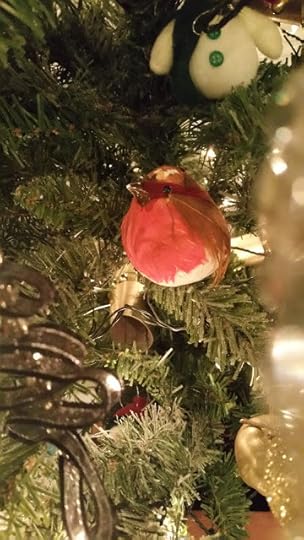
Thanks to everyone who has supported my blog this year. Wishing you all a peaceful Christmas and a very happy New Year
Please let me know what you think. Your comments are always welcome.
Published on December 24, 2015 11:39
December 13, 2015
Walking Back to Happiness
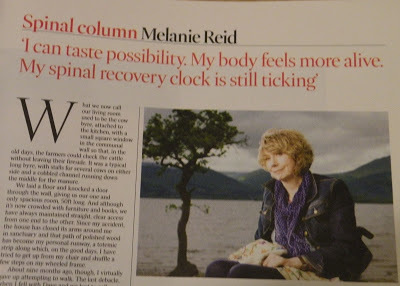
I made a Christmas Wish today for a woman I've never met. Melanie Reid, a successful Times journalist is tetraplegic after breaking her neck and back in a riding accident in April 2010.
And though her life was shattered that day, she has shared her high and lows ever since in her now infamous weekly Spinal Column. Her unremitting honesty has made me smile, weep, groan, commiserate, coil back in horror or hit the air with my fists... and yet I have never experienced pity.
Although she is officially paralysed she still has a degree of function. 'It takes 200 muscles to walk properly,' she says. 'I may have, oh, 50 in my legs and torso that, although they are rigid, unco-operative and sore, combine enough power to allow me to bear my own weight.'
The news recently hadn't been good - her desire to walk superseded by the reality of crippled hands, paralysed bowel and bladder, worn out shoulder joints and constant neuropathic pain. So earlier this year she gave up trying. 'Attempting to walk just caused me more heartache,' she recalled. 'It was a waste of other people's time; it served purely to remind me that I would never recover ; it exposed my past foolish bravado.'
That 'foolish bravado' can now be described as optimism. For the past month Melanie has been commandeering unsuspecting visitors to help her husband guide her along on the frame. In the beginning it was three steps before her leg buckled. Then, gradually, she made it further. This week, with the aid of her husband and brother, Melanie walked. 'I walked the length of the living room, ' she says, 'not once, not twice but three times.'
Which brings me back to my Christmas wish. Melanie now has hope for the future. Please, Santa, make that hope a reality.
Please let me know what you think. Your comments are always welcome.
Published on December 13, 2015 13:48
December 5, 2015
ROMANTIC ENGLISHMEN ARE STILL ALIVE AND LIVING IN YORKSHIRE
I was thrilled recently when local authors Helena Fairfax and Marie Laval asked if I would join them for a Coffee and Romance book-signing at the Old Gate, Hebden Bridge, one of Yorkshire's prettiest towns. We arrived on a dull but dry day and set up our stall.
What started as a slow trickle of customers soon turned into a stream on what turned out to be the wettest day of the year. And that was when the fun began. No amount of rain could daunt the customers who, despite being soaked to the skin, found time to make us feel welcome.
'What can I buy for my girlfriend?' asked one man who, book in hand, went in search of his mates to come and have a look. Over they came to choose books for their wives, girlfriends, mums, sisters (and one for his mother-in-law, too.)
Which brings me to the purpose of this short post: Romantic Englishmen are still alive and living in Yorkshire.
Thanks, guys, for turning a washout into a very successful day.
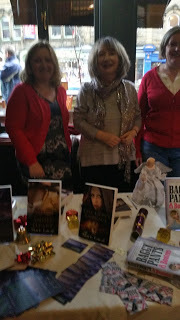 Marie, Marilyn and Helena - photo taken by a customer
Marie, Marilyn and Helena - photo taken by a customer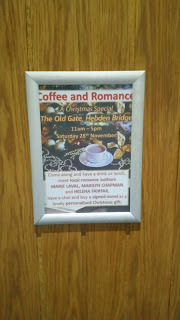 Fame at last in the Ladies!
Fame at last in the Ladies!
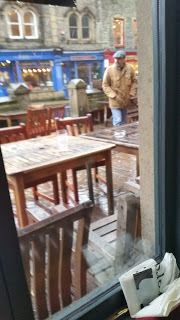 A man braves the rain.
A man braves the rain.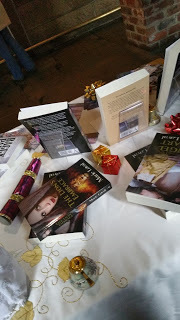
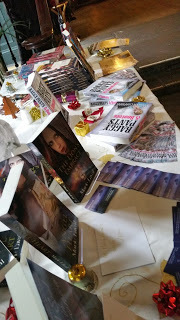
Please let me know what you think. Your comments are always welcome.
Published on December 05, 2015 13:05
November 23, 2015
OCCUPYING LOVE

My second historical novel Occupying Love, due out next year, is set in the German Occupation of the Channel Islands during World War Two. In this excerpt heroine Lydia Page returns to Guernsey on a sunny day in June 1940 unaware that her life is about to change forever.
Chapter One June 1940
The shock of that day never left her; it invaded her dreams and shadowed her waking moments. She could see herself now, carrying an old brown suitcase down the ship’s gangplank, her chocolate brown hair tousled by the fresh Guernsey breeze. In the year since she’d left the island nothing had changed. Fishing boats rocked from side to side, slapping waves against the harbour walls, yacht sails shimmered in the early evening sun, fine wisps of cloud skittering across the skies like pockets of hand-stitched lace.
Up ahead, the old tomato lorries wound their way like a wooden snake towards the cargo ships bound for England. Her papa had grown tomatoes in the greenhouses behind their home for as long as she could remember. Nowadays he didn’t need the income, but the twelve-pound fruit baskets – or ‘chips’ as the locals called them – were his pride and joy. Feeling exhilarated at the thought of seeing her parents again, Lydia headed for the bus terminus, stopping to rest on a bench by the harbour wall.
It started as a low rumble, growing steadily louder till it turned into a roar. Startled, she shaded her eyes from the sun and stared up into the sky. Three planes came into view, bright lights shining from their wings like the eyes of a giant eagle. A wave of raw fear rose up from her stomach. Someone shouted, ‘Enemy aircraft’ and her limbs froze. Lydia dropped to the ground, her face hitting the dirt as she landed. Bullets ricocheted over her head as she cowered in terror while the bombs plunged with sickening accuracy on to the harbour.
A piercing scream brought Lydia back to reality – it had come from her own lips. All around her people were crying or standing motionless in shock as blood dripped on to the pavements while air raid sirens, woken from their reverie, shrieked in protest. Coughing, she gasped for air, dense now with smoke, and tried to roll over.
‘You OK, Miss?’ A policeman loomed overhead. She fingered a cut on her face. ‘I think so. What happened?’
‘The Jerries have bombed the tomato lorries. Must ’ave mistaken them for tanks.’ He gripped her arm. ‘Can you get up?’
Nodding, she let him pull her off the ground.
‘I’d get out of here, if I were you. Fast as you can. It’s not safe.’
‘But Papa, what about Papa?’ A vision of her father lying dead in the rubble flashed in front of her eyes. ‘He’ll be in one of those lorries…’
‘If he’s out there now, Miss, there’s nothing you can do for him. You’d best find shelter in case the Jerries come again.’
Her suitcase long forgotten, Lydia headed for the dockside where a lone mother sat in the debris, cradling her daughter in the shelter of the harbour wall. The child was silent but the woman sobbed as smoke rose into the sky like a giant funeral pyre.
Lydia stumbled on, ignoring the shouts of well-meaning people; ‘come, shelter with us, Miss,’ the roar of fire engines and the sickening smell of burnt flesh. Where was her father…?
A familiar face appeared through the smoke. ‘Tom –Tommy!’ She’d known his family for years. ‘Have you seen Papa?’ She gestured towards the smouldering lorries.
‘The Jerries got their target, alright, but there’s plenty of folk sheltered under the pier. No-one can get through.’ Tommy Tostevin scratched his head. ‘What on earth are you doing here?’
‘It doesn’t matter now. I’m here and that’s the end of it. What can I do?’
‘Go home, my girl. Go to your mother. It’s going to be a long night.’
Lydia nodded, too numb to cry. She stumbled on down the esplanade towards the Weighbridge, the familiar granite tower now oozing smoke. Next to it stood a burnt out car with one headlight clearly visible amongst the wreckage. Staring up at the clock face, she saw that the hands had stuck at two minutes to seven.
Just then an ambulance came to a halt, its rear doors opened towards St Julian’s Avenue. With a burst of adrenalin she headed towards it and jumped inside.
‘You injured, Miss?’ The white-coated doctor looked up as she landed beside him.
‘No, I’m fine. It’s just that I know a bit about, well, medicine, and I wondered if I could help?’
‘There’s lots of injured people down there. It’s not a pretty sight. We could do with another pair of hands, though.’ He glanced at her. ‘Are you sure you’re up to it?’
She nodded. ‘Just tell me what you want me to do.’
‘Patch up your face first.’ He handed her a box of dressings. ‘Then follow me.’
They edged their way back to the burning lorries, the roar of engines filling the air: the enemy planes had returned. Lydia ducked and covered her head with the palms of her hands, her heart pounding louder than the shells that shook the ground beneath them.
She shut her eyes but the sight of blood mingling in the gutter with the juice of crushed tomatoes would stay with her forever.
Please let me know what you think. Your comments are always welcome.
Published on November 23, 2015 07:41
November 13, 2015
IF ONLY CANCER COULD TALK...
My Dad was a successful journalist. He loved life and he loved talking. Sadly, he also loved smoking and drinking. Which is why, in 1979, he had his tongue removed along with the tumour that had grown all the way down his throat. He survived, due to the dedication of two amazing surgeons. But his life was never the same again.
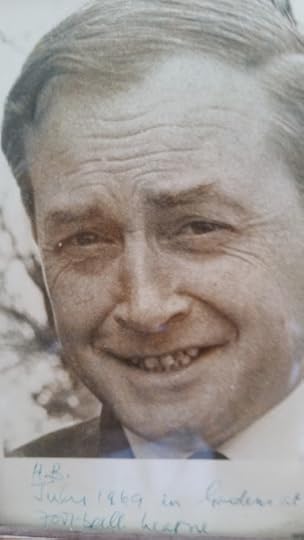 Harry Brown in 1969 outside the Football League in Lytham St Annes Lancashire where he was Public Relations officer
Harry Brown in 1969 outside the Football League in Lytham St Annes Lancashire where he was Public Relations officer
Below is an excerpt from an article I wrote in a national women's magazine at the time.
'We all remember Humphrey Bogart, Jack Hawkins, Steve McQueen, John Wayne, Diana Dors - the cast is endless. They all died in a blaze of publicity. But there are other, less well-know victims whose lives go on day by day - those who the doctors have saved from cancer but not from themselves.
In 1979 my father went into hospital for major surgery on a growth on his tongue. Six weeks later a man who bore my father's name returned home. The lively, gregarious, good looking man had been reduced to a shrivelled, mutilated wreck. The surgeons had saved his life but they had lost sight of his dignity.
His operation was very much an experiment, and he is still counting the cost. They removed his tongue (he is a journalist) and mutilated his face leaving him totally unable to speak and unrecognisable as the man he was before. He can talk now and he tells me in muted, muffled tones what it is like to be stared at by adults, jeered at by children - 'Been in a car crash have ya mister?' and regarded as a freak by the world around him.
Medical science has, of course, moved on since then. But what I didn't say in that article was that my father was terrified of dentists after waking up during a tooth extraction when he was a boy. He knew he had a 'sore' in his mouth but put off having it checked out until it was too late.
I'd like to think that telling his story today might help save someone's life.
Mouth Cancer Action Month is here to make people aware of this frightening disease. Please don't think it won't happen to you.
Mouth Cancer Action Month1 - 30 November 2015

What is Mouth Cancer Action Month?Mouth Cancer Action Month is a charity campaign which aims to raise awareness of mouth cancer and make a difference by saving thousands of lives through early detection and prevention.…
You can find out more about Mouth Cancer Action Month on Mouth Cancer FoundationPlease let me know what you think. Your comments are always welcome.
 Harry Brown in 1969 outside the Football League in Lytham St Annes Lancashire where he was Public Relations officer
Harry Brown in 1969 outside the Football League in Lytham St Annes Lancashire where he was Public Relations officerBelow is an excerpt from an article I wrote in a national women's magazine at the time.
'We all remember Humphrey Bogart, Jack Hawkins, Steve McQueen, John Wayne, Diana Dors - the cast is endless. They all died in a blaze of publicity. But there are other, less well-know victims whose lives go on day by day - those who the doctors have saved from cancer but not from themselves.
In 1979 my father went into hospital for major surgery on a growth on his tongue. Six weeks later a man who bore my father's name returned home. The lively, gregarious, good looking man had been reduced to a shrivelled, mutilated wreck. The surgeons had saved his life but they had lost sight of his dignity.
His operation was very much an experiment, and he is still counting the cost. They removed his tongue (he is a journalist) and mutilated his face leaving him totally unable to speak and unrecognisable as the man he was before. He can talk now and he tells me in muted, muffled tones what it is like to be stared at by adults, jeered at by children - 'Been in a car crash have ya mister?' and regarded as a freak by the world around him.
Medical science has, of course, moved on since then. But what I didn't say in that article was that my father was terrified of dentists after waking up during a tooth extraction when he was a boy. He knew he had a 'sore' in his mouth but put off having it checked out until it was too late.
I'd like to think that telling his story today might help save someone's life.
Mouth Cancer Action Month is here to make people aware of this frightening disease. Please don't think it won't happen to you.
Mouth Cancer Action Month1 - 30 November 2015


What is Mouth Cancer Action Month?Mouth Cancer Action Month is a charity campaign which aims to raise awareness of mouth cancer and make a difference by saving thousands of lives through early detection and prevention.…
You can find out more about Mouth Cancer Action Month on Mouth Cancer FoundationPlease let me know what you think. Your comments are always welcome.
Published on November 13, 2015 06:55
November 5, 2015
Do you read 'he-books' or 'she-books?'
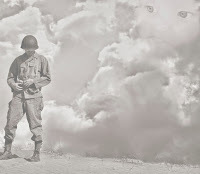
An early cover design for Baggy Pants and Bootees. Can you see the baby in the sky?
There's a man on the front cover of my debut novel - a soldier to be exact. Quite a few men have read Baggy Pants and Bootees since it was published last year, so I do know it appeals to both sexes.
There is, however, a strongly held view among publishers that men don't buy books written by women. I wonder why? They've always read women's magazines as far as I know - if only to understand the logic of the female mind - so it follows that they should read our novels. Or does it?
In an article in last week's Times newspaper, Antonia Senior, a writer of historical fiction, says 'I chose to write primarily from a male perspective. In my gender, if you choose a female protagonist who falls in love in even the smallest sub plot, she will be placed on the front cover, decorative and bosomy, gazing winsomely into the distance.' In short her solution was to 'go male.'
Antonia reserves 'a special convulsion of rage' for the women's fiction prize, formerly known as Orange, which celebrates its 20th anniversary this week. The newly named Bailey's Women's Prize for Fiction has been described as sexist by both novelists and critics alike.
Which brings me back to Baggy Pants and Bootees, a story of love, loss and war. Did I subconsciously soften the title to make it more acceptable to the female fiction- buying public? And should I do the same with the sequel? The heroine, Sophie Wainwright, is a woman in a man's world - not bosomy or particularly 'winsome,' just a typical sixties girl.
I wonder what she'll look like on the front of the next cover?
Baggy Pants and Bootees
Antonia Senior's novel The Winter Isles is available from November 5 2015.
Please let me know what you think. Your comments are always welcome.
Published on November 05, 2015 06:41
October 24, 2015
Wireless Connection? Just ask Bill!
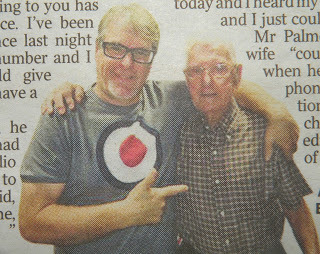 Ninety-five-year-old Bill Palmer pictured with DJ Alex Dyke in The Times newspaper this week.
Ninety-five-year-old Bill Palmer pictured with DJ Alex Dyke in The Times newspaper this week.When 95-year-old Bill Palmer married his wife, Sheila, last year after 30 years of friendship, life seemed perfect. Little did he know that his desperate loneliness would soon make him an internet sensation.
The plucky pensioner hadn't reckoned on the power of his own voice when he joined a phone-in on BBC Radio Solent when he had 'no-one else to talk to.'
Bill, it seems, has been been living alone in their bungalow since Sheila, 85, had a bad fall. She was taken to hospital and then then on to a nursing home, suffering from dementia. 'Every day is hell, he confessed to disc jockey Alex Dyke. ' She's just so happy when I see her.... (but) oh, I feel so alone.'
How did the disc jockey react? He sent a BBC car to pick up Mr Palmer and take him to the station for a cup of tea and a piece of cake. The emotional moment, captured on the radio station's facebook page, has been viewed almost 200,000 times.
Dyke, who was sadly too busy to see Bill when he visited the station last year said it was his 'nicest moment in 30 years of broadcasting.'
Meanwhile Bill has been inundated with offers of companionship, from Sunday lunch to a private concert by a ukulele orchestra - and a message from someone in North Carolina. When his wife found out what had happened she told him. 'We're the talk of the nation.'
I like to think this feel-good story is one with a mission, proving it wasn't always better in 'the good old days.' Local radio is the unsung hero of the airwaves these days keeping whole communities in touch with each other and, as a result, looking after their wellbeing. Only last year I was fortunate enough to be interviewed on BBC Radio Lancashire when DJ John Gillmore organised a 24 - hour interview marathon to raise money for Children in Need.
These acts of kindness are actually going on all day every day all over Britain. So don't forget to support your local radio station. You might even be saving someone's life.
Please let me know what you think. Your comments are always welcome.
Published on October 24, 2015 11:14
October 12, 2015
SEE NO WEEVIL, HEAR NO WEEVIL, SPEAK NO WEEVIL
'Jesus wants a little wee' my young daughter once sang in Sunday school, her slight muddling of the words casing much hilarity.
Yet it seems even the most well-read adults still make basic mistakes when it comes to pronunciation. According to today's Times newspaper, Don Quixote (that's Don-Key-Hoh-Tee to those in the know) has topped a list of literary names that people struggle to say correctly.
Quixote is joined by Daenerys Targaryen from Game of Thrones and Hermione from Harry Potter, 'both of which may be tricky for some but are less likely to be still causing readers problems in 400 years' time.'
Astonishingly, a survey of 2,000 people aged 18-65 found that 39 percent had pronounced the names of literary characters incorrectly. Some, it seems, even struggle over the name of Agatha Christie's Hercule Poirot. The poll follows the Harry Potter author JK Rowling's recent disclosure that Voldemort is actually pronounced 'Vol-De-Mor' - advice that does not seem to have been followed by the film's actors.
Even the names of the authors themselves can be a problem for some people. Eoin Colfer, author of the Artemis Fowl books, for example, is pronounced Owen Colfer and JM Coetzee, (twice Booker Prize winner) is pronounced Cut-Zee-Uh.
Most of us can remember a 'lightbulb' moment when we finally realised we had been mispronouncing a well-use word since childhood. Mine was the word tragedy which I had pronounced as trage-ty until the age of twelve when I saw the word written in huge letters in the headline of a tabloid newspaper.
In case you are wondering, my daughter should have sung Jesus' little ones are we. Meanwhile, if you have spent years of your life mispronouncing a word, I would love to hear from you.
Please let me know what you think. Your comments are always welcome.
Published on October 12, 2015 07:01
September 26, 2015
Take Life Bird by Bird
If life gets tough, take it bird by bird.
This advice comes from a well-thumbed and innocuous looking paperback, first published in 1994, which was brought back from America a few years ago by my daughter.
The book is Bird by Bird by Anne Lamott - author, teacher, public speaker and political activist -whose work sells in millions all over the world. It is not, as the title suggests, a handbook for ornithologists but, in Anne's own words, 'some instructions on writing and life.'
So why Bird by Bird? The title was inspired by Anne's brother who, at ten years old, was attempting to write a project on birds that he'd had three months to complete. It was due the next day and the task seemed impossible.
'We were in our family cabin,' writes the author 'and my brother was at the kitchen table, close to tears, surrounded by paper, pens, pencils and unopened books on birds, immobilized by the hugeness of the task ahead. Then my father sat down beside him, put his arm round my brother's shoulder and said 'Bird by Bird, son. Just take it bird by bird.'
The moral? If you deal with a major task in bite-sized chunks you are much more likely to succeed. ( I happen to know she's right because I've followed this advice ever since.)
One of Anne's roles is to teach budding authors, some of whom already have experience, some who just want to learn how to write. 'Becoming a writer is about becoming conscious, she says. Write about your childhood, write about the time when you were so intensely interested in the world, when your powers of observation were at their most acute, when you felt things so deeply. Exploring your childhood will give you the ability to empathize and that understanding and empathy will teach you to write with intelligence an insight and compassion.
It seems to me that Anne's advice applies not just to writers but to every one of us. How can we be kind to each other if we have not first learnt to be kind to ourselves? How can we face what seems like an impossible task unless we break it down into small tasks that gradually chip away at the bigger problem?
And so the lesson in life is simple: frame by frame for photographers, term by term for teacher, pun by pun for politicians, minute by minute for the unmotivated... I could go on but I'm just too busy planning my next project!
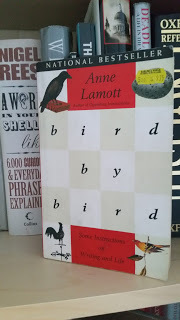 Please let me know what you think. Your comments are always welcome.
Please let me know what you think. Your comments are always welcome.
This advice comes from a well-thumbed and innocuous looking paperback, first published in 1994, which was brought back from America a few years ago by my daughter.
The book is Bird by Bird by Anne Lamott - author, teacher, public speaker and political activist -whose work sells in millions all over the world. It is not, as the title suggests, a handbook for ornithologists but, in Anne's own words, 'some instructions on writing and life.'
So why Bird by Bird? The title was inspired by Anne's brother who, at ten years old, was attempting to write a project on birds that he'd had three months to complete. It was due the next day and the task seemed impossible.
'We were in our family cabin,' writes the author 'and my brother was at the kitchen table, close to tears, surrounded by paper, pens, pencils and unopened books on birds, immobilized by the hugeness of the task ahead. Then my father sat down beside him, put his arm round my brother's shoulder and said 'Bird by Bird, son. Just take it bird by bird.'
The moral? If you deal with a major task in bite-sized chunks you are much more likely to succeed. ( I happen to know she's right because I've followed this advice ever since.)
One of Anne's roles is to teach budding authors, some of whom already have experience, some who just want to learn how to write. 'Becoming a writer is about becoming conscious, she says. Write about your childhood, write about the time when you were so intensely interested in the world, when your powers of observation were at their most acute, when you felt things so deeply. Exploring your childhood will give you the ability to empathize and that understanding and empathy will teach you to write with intelligence an insight and compassion.
It seems to me that Anne's advice applies not just to writers but to every one of us. How can we be kind to each other if we have not first learnt to be kind to ourselves? How can we face what seems like an impossible task unless we break it down into small tasks that gradually chip away at the bigger problem?
And so the lesson in life is simple: frame by frame for photographers, term by term for teacher, pun by pun for politicians, minute by minute for the unmotivated... I could go on but I'm just too busy planning my next project!
 Please let me know what you think. Your comments are always welcome.
Please let me know what you think. Your comments are always welcome.
Published on September 26, 2015 12:28
September 10, 2015
Romance is alive and living in Yorkshire....
 From left to right: Sue Barnard, Yours truly, Leah Fleming and Fiona Lindsay Take a bevy of authors, a sprinkling of comedy and an abundance of home made cakes, add chilled Prosecco, good company and mix well. Leave in majestic surroundings for four hours and watch the contentment spread.
From left to right: Sue Barnard, Yours truly, Leah Fleming and Fiona Lindsay Take a bevy of authors, a sprinkling of comedy and an abundance of home made cakes, add chilled Prosecco, good company and mix well. Leave in majestic surroundings for four hours and watch the contentment spread.This was the perfect recipe for the Romantic Novelists' Association afternoon tea held in the historic city of York last weekend. It was great to meet up with new friends Sue Barnard and Fiona Lindsay as well as popular author Leah Fleming whose novels I first discovered more than twenty years ago - and have been a fan of ever ever since.
The highlight of the day was an hilarious talk on 'Northern Birds' by best-selling author Milly Johnson. In case you are wondering, Millie is not an ornithologist, but an expert on the workings of the minds of the Northern woman, as well as an accomplished speaker!
This was my first event as a member of the Romantic Novelists' Association and I'm looking forward to many more.
t[image error]Just some of the lovely food
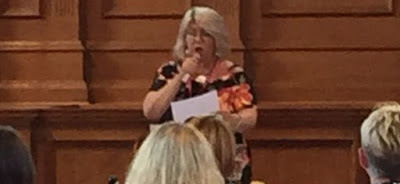 Milly Johnson keeps the audience spellbound
Milly Johnson keeps the audience spellbound
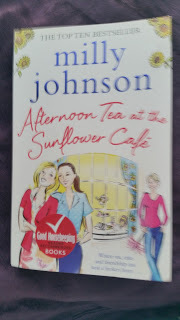 Milly Johnson's new bestseller Afternoon Tea a the Sunflower Cafe
Milly Johnson's new bestseller Afternoon Tea a the Sunflower CafePlease let me know what you think. Your comments are always welcome.
Published on September 10, 2015 05:50



